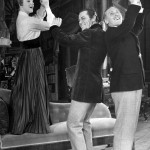Geraldine Ferraro, having suggested publicly not once, but twice, over the course of 20 years and two African-American presidential bids, that (essentially) the black man can only ascend to the presidency through affirmative action or white guilt, is stepping down from her position in the Clinton campaign’s finance committee:
Ferraro said she is stepping down so, “I can speak for myself and you can continue to speak for yourself about what is at stake in this campaign.”
Okay. Possibly she wasn’t in the mood to endure any further heat for her comments, or she doesn’t want to open Hillary up to the logical response to her charges, which would be, “how does your theory differ from the theory that Hillary is only where she is because she was married to Bill?” – a question I am sure the Clinton campaign does not want long-bubbling to the surface.
This brouhaha – coupled with the fact that Barack Obama won Mississippi yesterday with 90% of the black vote while Hillary took a similar proportion of the white vote – has a lot to say about the way Democrats have talked themselves into a corner on identity politics, but it also has a lot to say about race relations in the nation. We clearly have a ways to go.
A while back I wrote a piece, Hillary, Obama and the National Psyche, which brought me a lot of hate mail. Jumping off an essay by CBS’ Dick Meyer, I wrote:
…and I truly believe – or maybe I just really want to believe – that Martin Luther King’s dream of a person being judged by “the content of their character” is in some ways, a vision almost achieved. But, sadly, only almost.
These days, I think white folks still harbor some racism, but it is expressed less as discrimination or hate and more as an over-appreciation – that condescending old “soft bigotry of low-expectations” – for any outstanding quality in a prominent person of color. You never hear someone say that a white person is “so articulate!”
[…]
The candidacies of Hillary Clinton and Barack Obama are going to force – and hopefully help – the country to finally confront bigotries old and new. If the nation can start to really dialogue about racism and sexism honestly and openly, unconstrained by political correctness or by the knee-jerk fingerpointing and labeling that has managed to muddy up and obfuscate any real discussion on those issues for a few decades, that will be a very good thing, for all of us. I wonder if we’re ready.
Apparently, we are not ready to have that conversation, because to do so means deconstructing many of the social constructs that the liberals themselves have put into place. Obama can’t criticize Hillary because she is a woman; he cannot suggest that her remarkable forbearance with her husband is partly responsible for her position in the party without being called a sexist. (Chris Matthews had to apologize for daring to say it). Hillary cannot criticize Obama because he is black and if she suggests that his achievements are given more weight because of his race than his impressive oratory, she will be called a racist.
We’re not “allowed” to say these things, to explore whether or not they may be true, because identity politics has made the questions toxic, the only antidote being to call the questioner an “ist.” A racist. A sexist. Ms. Ferraro seems not to know that. She may have done the nation a favor, because now perhaps a conversation may begin, if we dare let it.
Well, here’s another fine mess, one that has its genesis in a movement that put more energy into empowering “races” and “genders” – qualities that had nothing at all to do with gifts, or the content of a person’s character – than into simply recognizing the outstanding work of individual persons. Acknowledging individuals takes too long when you’re trying to correct longstanding injustices, but both of these candidates have been shortchanged by the shortcuts. Hoisting people onto pedestals by the virtue of their gender, race or sexuality, rather than by virtue of their gifts and being, has muddied our waters.
I know a little whereof I speak, here. When my brother died we had to deal with well-meaning people who seemed to think his death was rendered more noble, and more tragic than other deaths, because he was a gay man who died of AIDS. Because they were very well-meaning folks, I tried not to take offense, but I had to tell them, “you are right, his death is tragic and noble…tragic because he was only 41 years old and the kindest man you’ll ever know; noble because he faced all of this with a lionhearted and valiant character that has enlarged and instructed the rest of us in faith, in love and in what real courage means. His being gay, the nature of his disease, they were incidental to the man.”
The corrective recipe of the early 1970’s – a corrective of quotas, affirmative actions and “specialness” – contained too many parts condescension and overpraise and not enough simple validation, which – in a free market – should have led, logically, to the sort of advancement that inspired others to rise to their inborn potentialities and therefore brought about change with depth and substance. Instead, we have talented people whose valid gifts and achievements are suspect and open to question, because they are partly obscured by the longstanding fog of “identity feel-goodism,” and its cousin, social hypersensitivism.
The “everyone is special” way has failed. There are serious candidates running for president, this very night, who are hauling about the baggage of a policy that smiled too much and only meant half of what it said. If we had a gay candidate, he or she would be hauling about a bit of that same baggage. Now we must look at the nation and acknowledge that even our most “well-meaning” identies are running around harboring doubt about the “other” identities and playing the doubt card, when it is politically expedient to do so.
As the Ferraro news was breaking, Cat from Brits at their Best, who had seen my post on Frank Sinatra, was sending along to me this link to Joe’s Dartblog, where he highlights a very famous performance – one that so moved my own father that he spoke about it for years – Sinatra singing “Ol Man River.”
Cat wrote to me:
Close your eyes while you listen (if you can bear to take them off Sinatra’s face) and tell me this isn’t one of the most moving anti-slavery songs in American songbook history. And then, when he’s done, and the audience bursts into applause, glimpse Frank’s humility. He knows it’s not about him.
She is right. This is a deeply effective – and affecting – performance.
Nowadays, a white singer would probably be told he has no right to sing the song, but Sinatra’s work here is humble and moving. This was a man who had credited Ella Fitzgerald and Ethel Waters with teaching him phrasing and breath control (watch him about two thirds through sing a huge phrase on one inhale, thanks to Ethel) – he came up respecting and loving Count Basie and Billie Holliday, Duke Ellington and so many other musical geniuses who made room for him, and who were allowed to perform for the white crowds, but not to eat with them or enter through a showroom’s front doors. In his book Yes I Can, Sammy Davis Jr recounted episodes where Sinatra came to fisticuffs with other whites for the way blacks were treated. Davis wrote (paraphrasing) that he held himself back from entering a nightclub he knew was “restricted” and Sinatra told him, “pay no attention to that, you don’t need anyone’s permission.” So, I think we can trust that this white man – whose own life was fraught with drama – had some understanding of how the river of racism rolled along in this nation, heavy with the mud of distrust and fear and how, seemingly, it rolls on and on still.
UPDATE: Unsurprisingly, I’m getting the “you’re a racist and you’re stupid” emails from the usual folks. Whatever – go ahead, call me names – that’s easy to do. Andy Bryant sent me this transcript of an episode of Will & Grace that some may find amusing or even relevant.
Ann Althouse examines Hillary’s condescending non-apology for Ferraro.
Small Dead Animals has linked! Thanks!
Also writing:
Gateway Pundit
Stop the ACLU
Ed Morrissey at Hot Air
Sister Toldjah
Blue Crab Boulevard
Michelle Malkin
Politico
Jake Tapper
Jim Geraghty
Protein Wisdom
Just One Minute
Baldilocks











